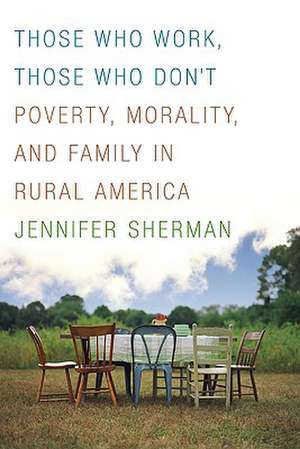Those Who Work, Those Who Don't: Poverty, Morality, and Family in Rural America
Autor Jennifer Shermanen Limba Engleză Paperback – 22 oct 2009
When the rural poor prioritize issues such as the right to bear arms, and disapprove of welfare despite their economic concerns, they are often dismissed as uneducated and backward by academics and political analysts. In Those Who Work, Those Who Don't, Jennifer Sherman offers a much-needed sympathetic understanding of poor rural Americans, persuasively arguing that the growing cultural significance of moral values is a reasonable and inevitable response to economic collapse and political powerlessness.
Those Who Work, Those Who Don't is based on the intimate interviews and in-depth research Sherman conducted while spending a year living in "Golden Valley," a remote logging town in Northern California. Economically devastated by the 1990 ruling that listed the northern spotted owl as a threatened species, Golden Valley proved to be a rich case study for Sherman. She looks at how the members of the community coped with downward mobility caused by the loss of timber industry jobs and examines a wide range of reactions. She shows how substance abuse, domestic violence, and gender roles fluctuated under the town's economic strain.
Compellingly written, shot through with honesty and empathy, Those Who Work, Those Who Don't is a rare firsthand account that studies the rural poor. As incomes erode and the American dream becomes more and more inaccessible, Sherman reveals that moral values and practices become a way for the poor to gain status and maintain a sense of dignity in the face of economic ruin.
Those Who Work, Those Who Don't is based on the intimate interviews and in-depth research Sherman conducted while spending a year living in "Golden Valley," a remote logging town in Northern California. Economically devastated by the 1990 ruling that listed the northern spotted owl as a threatened species, Golden Valley proved to be a rich case study for Sherman. She looks at how the members of the community coped with downward mobility caused by the loss of timber industry jobs and examines a wide range of reactions. She shows how substance abuse, domestic violence, and gender roles fluctuated under the town's economic strain.
Compellingly written, shot through with honesty and empathy, Those Who Work, Those Who Don't is a rare firsthand account that studies the rural poor. As incomes erode and the American dream becomes more and more inaccessible, Sherman reveals that moral values and practices become a way for the poor to gain status and maintain a sense of dignity in the face of economic ruin.
Preț: 101.13 lei
Preț vechi: 124.28 lei
-19% Nou
Puncte Express: 152
Preț estimativ în valută:
19.36€ • 19.95$ • 16.34£
19.36€ • 19.95$ • 16.34£
Carte indisponibilă temporar
Doresc să fiu notificat când acest titlu va fi disponibil:
Se trimite...
Preluare comenzi: 021 569.72.76
Specificații
ISBN-13: 9780816659050
ISBN-10: 0816659052
Pagini: 264
Ilustrații: 6
Dimensiuni: 140 x 216 x 18 mm
Greutate: 0.29 kg
Ediția:1
Editura: University of Minnesota Press
Colecția Univ Of Minnesota Press
ISBN-10: 0816659052
Pagini: 264
Ilustrații: 6
Dimensiuni: 140 x 216 x 18 mm
Greutate: 0.29 kg
Ediția:1
Editura: University of Minnesota Press
Colecția Univ Of Minnesota Press
Notă biografică
Jennifer Sherman is assistant professor of sociology at Washington State University.
Cuprins
Preface: Preserving Anonymity
Acknowledgments
Introduction: Poverty, Morality, and Family in Rural America
1. The Place I Found: An Introduction to Golden Valley
2. Workers and Welfare: Poverty, Coping Strategies, and Substance Abuse
3. Family Life: Tradition and Safety
4. Remaking Masculinity: Losing Male Breadwinners
Conclusion: Understanding Poverty in Rural America
Appendix: General Interview Protocol for Male Respondents
Notes
Bibliography
Index
Acknowledgments
Introduction: Poverty, Morality, and Family in Rural America
1. The Place I Found: An Introduction to Golden Valley
2. Workers and Welfare: Poverty, Coping Strategies, and Substance Abuse
3. Family Life: Tradition and Safety
4. Remaking Masculinity: Losing Male Breadwinners
Conclusion: Understanding Poverty in Rural America
Appendix: General Interview Protocol for Male Respondents
Notes
Bibliography
Index
